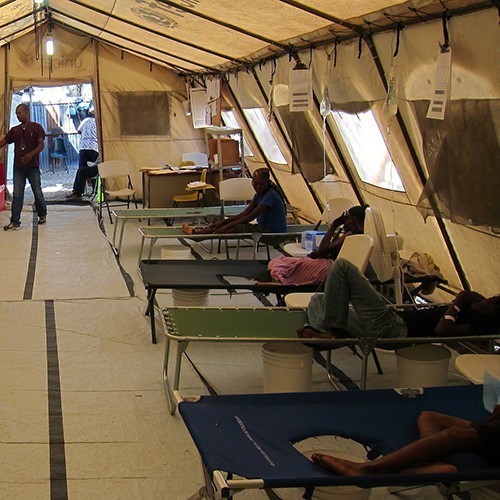
©CDC Global, 2013. Patients receive care at a cholera treatment center in Port-au-Prince, Haiti.
Last We Knew: Beginning in 2011, victims of a cholera outbreak in Haiti turned to U.S. courts in an effort to receive reparations from the United Nations. Several analyses and reports have charged the organization for introducing the disease, which was previously unknown in the country.
The outbreak began in October 2010 and has been linked to an infected UN peacekeeping force from Nepal stationed near the Artibonite River. Although the United Nations didn’t directly accept responsibility for the spread, a 2011 report prepared by independent experts at UN request pointed to unsanitary conditions at the peacekeepers’ camp as the likely source of infection.
Since then at least two other suits have been filed on behalf of victims, currently estimated to include nearly 10,000 people who have died and another 800,000 infected (although a recent study indicates numbers could be much higher). Although numerous governments, retired UN officials, and the UN independent expert on human rights have urged the organization to make amends for the outbreak, the UN has consistently sidestepped culpability and maintained that diplomatic conventions make it immune from legal consequences.
The Latest: Even as a court ruling dismissed the most recent appeal in the case last week, UN officials are finally beginning to speak in terms of “its own involvement,” and take tentative responsibility for its role in the outbreak, according to news reports.
The change in tone comes in conjunction with the publication of snippets of a soon-to-be-released report by a UN advisor on human rights. The 19-page report, which was acquired by the New York Times, places blame squarely on UN shoulders and calls the UN’s treatment of those seeking compensation “wholly unconvincing in legal terms.”
The advisor, Philip Alston—a New York University law professor serving as what is known as a special rapporteur—reminded UN officials that continuing to deny families redress could be potentially more expensive than doing the right thing.
“The figure of $40 billion should stand as a warning of the consequences that could follow if national courts become convinced that the abdication policy is not just unconscionable but also legally unjustified,” Alston wrote according to the Times. “The best way to avoid that happening is for the United Nations to offer an appropriate remedy.” He also pointed out the extreme damage such a stance has had on the UN’s already smudged reputation.
“It provides highly combustible fuel for those who claim that UN peacekeeping operations trample on the rights of those being protected, and it undermines both the UN’s overall credibility and the integrity of the Office of the Secretary-General,” Alston wrote.
Coming Up: The UN response to the report seemed to be fairly receptive, with a deputy spokesman for Secretary General Ban Ki-moon saying that the UN welcomed the report as it worked toward “a significant new set of UN actions.”
That statement was followed by Ban calling on member states to contribute the remaining 80 percent of the $2.2 billion that’s estimated to be needed to eradicate cholera in Haiti by 2022.
Despite what could be indications of a change in UN tack, however, the organization has stopped short of acknowledging wrongdoing in a way that could make it legally liable—leaving legal experts, humanitarians, and many others to speculate what might count as true accountability.
In the meantime, Alston’s report will go through revisions and be formally presented to the UN General Assembly in September, according to the Times, while the UN plans to unveil a new cholera response within the next two months.
Jolie Breeden is the lead editor and science communicator for Natural Hazards Center publications. She writes and edits for Research Counts; the Quick Response, Mitigation Matters, Public Health, and Weather Ready Research Award report series; as well as for special projects and publications. Breeden graduated summa cum laude from the University of Colorado Boulder with a bachelor’s degree in journalism.